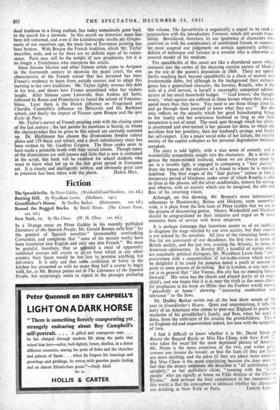Fic t ion
tos. 6d.)
IN a 30-page essay on Perez Galdos in his recently published Literature of the Spanish People, Mr. Gerald Brenan calls him "far the greatest of Spanish novelists" (presumably overlooking Cervantes), and complains that "none of his mature works have been translated into English and only one into French."- We must be grateful, therefore,:that so viendid a meal of apparently unlimited courses still awaits us a' an hour which in any other country than Spain would be too late to promise anything but left-overs. It is only sad that some confusion OV hurry in the kitchen has presented us with no more than half a course to begin witff, for, as Mr. Brenan points out in The Literature of the Spanish People, but surprisingly omits to repeat in the passages prefacing
this volume, The Spendthrifts is organically a sequel to be read in conjunction with the introductory Torment, which still awaits trans- lation. Bewildered, therefore, by our ignorance of characters who confront us with the complacency of established friends or enemies, we must suspend our judgement on certain apparently arbitrary defects of technique and balance in a novelist who is otherwise an assured Master of his medium.- The spendthrifts of this novel are like a disordered nerve which :cOnnects into the cortex of the decaying royalist society of Madrid on the eve of the queen's deposition iq 1869. There are spend- thrifts reaching back beyond spendthrifts in a chain of mutual and irredeemable debts, but although in the background their extrava- gance has a generalised character, the heroine, Rosalia, who is the wife of a 'civil servant, is herself a reasonably competent' admini- strator of her small household budget. " " God knows,' she thought wisely, 'what agonies are suffered in those houses where they always spend more than they have. You need to see those things close to, and go through them yourself to knowwhat they are.'" But she only reflects on the security which her good housekeeping brings to -her family and her avaricious husband is long as. one fatal temptation is out of mind. The weak spot through which her ability is penetrated and over-turned is her passion for dress, to which she sacrifices first her jewellery, then her husband's savings, and finally her self-respect. Like a major social echo of her failure, the royalist society of the capital collapses as her personal degradation becomes complete.
- The story is told lightly, with a nice sense of comedy and a wonderfully sympathetic insight into the characters. By a stroke of genius the mean-minded husband, whom we are always made to See in a lovable light, is engaged in composing a "hair' picture" from the tresses of the relatives of a friend to whom he is morally indebted. The final stages of the "hair picture" induce in him a temporary period of blindness, under cover of which Rosalfa is able to dress as she pleases, sell the silver candlesticks, remove his savings and observe, with an anxiety which can be imagined, the ebb and flow of his returning vision.
Although, on this showing, Mr. Brenan's more international references to Dostoievsky, Balzac and Dickens, seem somewhat wide, it is plain from the- first taste of Perez Galdos that we are in the process of discovering genius. Messrs. Weidenfeld and Nicolson should be congratulated on their initiative and urged on tb more extensive feats of service with fewer misprints.
It is perhaps fortunate that historians assure us of an inability to diagnose the stage reached by our own society, but their reserve Is not echoed by the novelists. All four of the remaining books on this list are convinced of our decadence, the first two in terms of British senility, and the last two, crossing the Atlantic, in terms of American adolescente. In Rotting Hill, a handful of stories which are essentially political dialogues, ,Mr. Wyndham Lewis finds "rot everywhere with a concentration of rot-in-the-vision which would be delightful if he could for instance detect a patch of non-rot or point to some process of de-rotting. But in London, at any rate, the rot is so general that "like Vienna, this city has no meaning hence- forward." His voice has the charm and absurd purity of an angry child's, and one hopes that it is as near-the truth as the more cheer- ful prophecies in his book on Hitler that the Fuehrer would remain "peacefully at home" showing "increasing moderation and tolerance" to the Jews.
Mr. Dudley Barker writes one of the best 'short novels of the year in Grandfather's House. Quiet and unpretentious, it tells the story of an American who comes to post-war England to probe the mysteries of his grandfather's family, and flees, when his work is done, from the embraces of his cousins the grandchildren. This is an England old and impoverished indeed, but seen with the sympathy of lave.
I find it difficult to know whether it is Mr. David Niven in Round the Rugged Rocks or Miss Ilka Chase, with New York L.:, who takes the °scarf& the most depressed picture 'orAmeri,:a. Mr. Niven is the more conscious of the two, an.d writes gaily, comme une fenzme du monde, so that the facts (if they are facts) are more startling, and the jokes (if they' are jokes) more extreme. But Miss Chase is the more convincing because she does seem to feel that the dreary emptiness -she describes is "all scintillating and sprightly," as her publishers claim, "teeming with the
people' who are equally at home on Fifth -Avenue or the Champs Elysees." And perhaps the final compliment te her immersion In this world is that the atmosphere is identical whether her charactzrs are drinking in New York or Paris. TANGYE LEAN.






































 Previous page
Previous page